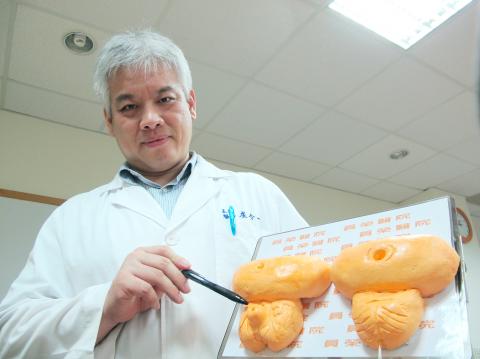A 50-year-old man infected with human papilloma virus (HPV) recently underwent a total penectomy operation, or total penile resection, after being diagnosed with squamous cell carcinoma of the penis — the most common type of penile cancer.
According to Yuan Rung Hospital urologist Lu Lieng-yi (盧令一), who treated the patient, the man only resorted to medical assistance after his penis started to severely fester and bleed.
A tissue biopsy showed that the man had long been infected with HPV. A lack of timely treatment allowed the sexually transmitted disease to develop into penile cancer, Lu said.

Photo: Ruan Yi-yu, Taipei Times
The patient, who said that he had a history of multiple sexual partners, said he was unaware of his physical illness until recently, when he went to the bathroom and noticed that there was blood coming from his penis.
However, as the man did not feel any itchiness or pain inside or outside his reproductive organ, which he could not directly see because of his oversize abdomen, he failed to seek any therapy, Lu said.
Lu said that although the man had not engaged in sexual intercourse for some time, the HPV, which can lead to genital warts, could only be treated, but not fully eradicated. The virus would remain in the human body and trigger a relapse when the infected patient’s immune system started to weaken.
The majority of men with penile cancer only require partial penectomy and most maintain their sexual and urinary functions after such surgery, as the disease is inclined to develop around the glans only.
However, the primary infected part of the man was at the center of his penis, which meant that he required a total penectomy to keep the cancerous tumor from further spreading.
Lu said that he was at first concerned the patient would not be willing to allow such an extreme operation, but it took the man less than a day to decide to undergo the resection surgery.
“I had tried everything I should and everything I should not have, and now, in order to save my own life, it would not be much of a pity anymore to remove it,” Lu quoted the patient as saying.
On the patient’s postoperative recovery, Liu said the man would have to receive urethral reconstruction between his testicles to restore his urinary function, but he would only able to urinate in a squatting position for the rest of his life.
However, Liu said that the operation would not cost the patient his masculinity, as his testicles, which are responsible for producing sperm and testosterone, would remain intact.
“Although the patient is given the option to receive genital reconstruction surgery at a later date to restore the best possible appearance, his sexual function is not likely to be recovered,” Lu said.
The most effective preventive measure of sexually transmitted diseases remains avoiding risky sexual behavior such as having multiple sexual partners or engaging in unprotected sexual activity, Lu said, adding that people who experienced bleeding from their reproductive organs are advised to seek immediate medical consultation.

US climber Alex Honnold is to attempt to scale Taipei 101 without a rope and harness in a live Netflix special on Jan. 24, the streaming platform announced on Wednesday. Accounting for the time difference, the two-hour broadcast of Honnold’s climb, called Skyscraper Live, is to air on Jan. 23 in the US, Netflix said in a statement. Honnold, 40, was the first person ever to free solo climb the 900m El Capitan rock formation in Yosemite National Park — a feat that was recorded and later made into the 2018 documentary film Free Solo. Netflix previewed Skyscraper Live in October, after videos

Starting on Jan. 1, YouBike riders must have insurance to use the service, and a six-month trial of NT$5 coupons under certain conditions would be implemented to balance bike shortages, a joint statement from transportation departments across Taipei, New Taipei City and Taoyuan announced yesterday. The rental bike system operator said that coupons would be offered to riders to rent bikes from full stations, for riders who take out an electric-assisted bike from a full station, and for riders who return a bike to an empty station. All riders with YouBike accounts are automatically eligible for the program, and each membership account

A classified Pentagon-produced, multiyear assessment — the Overmatch brief — highlighted unreported Chinese capabilities to destroy US military assets and identified US supply chain choke points, painting a disturbing picture of waning US military might, a New York Times editorial published on Monday said. US Secretary of Defense Pete Hegseth’s comments in November last year that “we lose every time” in Pentagon-conducted war games pitting the US against China further highlighted the uncertainty about the US’ capability to intervene in the event of a Chinese invasion of Taiwan. “It shows the Pentagon’s overreliance on expensive, vulnerable weapons as adversaries field cheap, technologically

NUMBERs IMBALANCE: More than 4 million Taiwanese have visited China this year, while only about half a million Chinese have visited here Beijing has yet to respond to Taiwan’s requests for negotiation over matters related to the recovery of cross-strait tourism, the Tourism Administration said yesterday. Taiwan’s tourism authority issued the statement after Chinese-language daily the China Times reported yesterday that the government’s policy of banning group tours to China does not stop Taiwanese from visiting the country. As of October, more than 4.2 million had traveled to China this year, exceeding last year. Beijing estimated the number of Taiwanese tourists in China could reach 4.5 million this year. By contrast, only 500,000 Chinese tourists are expected in Taiwan, the report said. The report